One measure of good carpentry is work that is level and plumb or, more generally, staying true to the angle of the work. For centuries, craftsmen of all stripes have used the spirit – or bubble – level to accomplish this. Over the last couple of decades, lasers have been incorporated to shoot lines over long surfaces, but the old, reliable bubble was first needed to find level. Technology trickles down as it always does and today I have the opportunity to check out the inexpensive Ryobi Multi Surface Laser Level, a compact level and laser combination with several features designed to keep you true to the angle. Let’s check it out.
First Impressions
This level is a compact unit with both horizontal and vertical vials. The laser, powered by two AAA batteries, is turned on and off by an easily identifiable white button. Perhaps most interesting is the easily removable 90-degree protractor to which it’s attached. It might come in handy for those times when an angle other than 90 or 0 is required.
The “Multi Surface” in the title refers to the three options for attaching the laser level to surfaces: suction cups, pins, and magnets. The suction cups and magnets are embedded in the tool body, and the pins, which poke through holes in the body, have onboard storage. Ryobi claims the laser has a 20-foot range so we brought it along to a home remodel/refurbishment to see what it could do.
I must admit at the outset that I don’t currently have a tool like this and I’m curious to see if it meets a professional’s requirements. All I can do is give it an honest shot to make the team.
Laser Beam Me Up
The home remodel/refurbish that I mentioned is a project that we use to fill in between bigger jobs. As you might expect, parts of both the interior and exterior are in various states of completeness. As we worked throughout several days, I looked for opportunities to put the Ryobi Multi Surface Laser Level to good use and had a bit of a hard time. However, before digging deep on this construction site, let’s discuss how the features work in the abstract.
The Power of Three
First, the three options for surface attachment are a great idea. The suction cups can attach to windows or other non-porous, flat materials. This has several potential uses, but the first thing that comes to mind is you can install window treatment hardware with it. The magnets have similar usefulness around ferrous materials like steel structures.
The ability to pin the unit to plaster or drywall probably has the most utility. With the protractor attached, the user can quickly find angles along a long, flat surface. Helpfully, the push pins can also be used to pin the protractor in place, while the small gray knob holding the laser to the protractor tightens down to hold the angle. I found the laser to be plenty bright enough inside to accomplish a long line.
Pro or DIY?
Still, searching for other reviews reveals what I suspected: users are overwhelmingly homeowners/DIYers who rated the Ryobi Multi Surface Laser Level very highly for hanging pictures, shelves, possibly a suspended ceiling, and so on, but you’d be hard-pressed to find a Pro’s review (until now!).
Even so, let me suggest a couple places where Pros could find the Ryobi useful. One of the most salient long angles in a home is a staircase. By using the protractor, a carpenter can shoot a laser line up the wall to keep the angle. This would obviate popping a chalk line or constantly rechecking the rake to be sure the project is on course.
Another use is conventionally framing a roof. Say you have a wall that another pitch is going to intersect. The roof is to be a 5/12 pitch, which is 22.5 degrees. The carpenter can put the laser on the bottom of the wall, shoot the 22.5 degrees up the wall, and put a rafter on it. You wouldn’t have to deal with a square or popping a line.
Is it likely that the Pros will move from their current method to this?
Probably not, but those are a couple of ideas.
The Bottom Line
The Ryobi Multi Surface Laser Level is a two AAA-battery powered, dual vial bubble level with a 20-foot laser range that can attach to surfaces using the onboard suction cups, magnets, or push pins. It also features an easily-removed 90-degree protractor for angles other than 90 or 0.
The laser level has a lot of utility for the homeowner/DIYer but it’s harder to find professional uses for it on the construction site. That certainly doesn’t mean it’s a bad product, though!
Ryobi often straddles the line of the Pro and DIYer and many of its recent offerings are solidly in the Pro category. In fact, I have a trailer full of many Ryobi tools because I think they represent a great value.
In the case of the Ryobi Multi Surface Laser Level, it might just stay in the realm of the DIYer. However, Pros might find it useful for shooting long staircase angles or finding the right pitch on a conventionally framed roof. At just $24.97, it’s not a big risk to find out if it might make your life easier.
Ryobi Multi Surface Laser Level Features
- Model number: ELL1750 – $24.97
- Horizontal and vertical bubble vials for accurate leveling
- 20-foot laser range
- On-board pin storage underneath mounting cradle
- Multiple mounting options: magnet, pins, or suction cup
- Convenient, hands-free design
- Angle finder alignment plate
- Includes: multi-surface laser level, mounting cradle, 2 pins, angle finder alignment plate, 2 AAA batteries and operator’s manual
Ryobi Multi Surface Laser Level Specifications
- Depth: 1.6-inch
- Length: 3.51-inch
- Height: 1.38-inch
- Width: 3.51-inch
- Batteries included: yes
- Battery type: AAA
- Number of batteries: 2
- Number of beams: 1
- Manufacturer’s warranty: 3 years

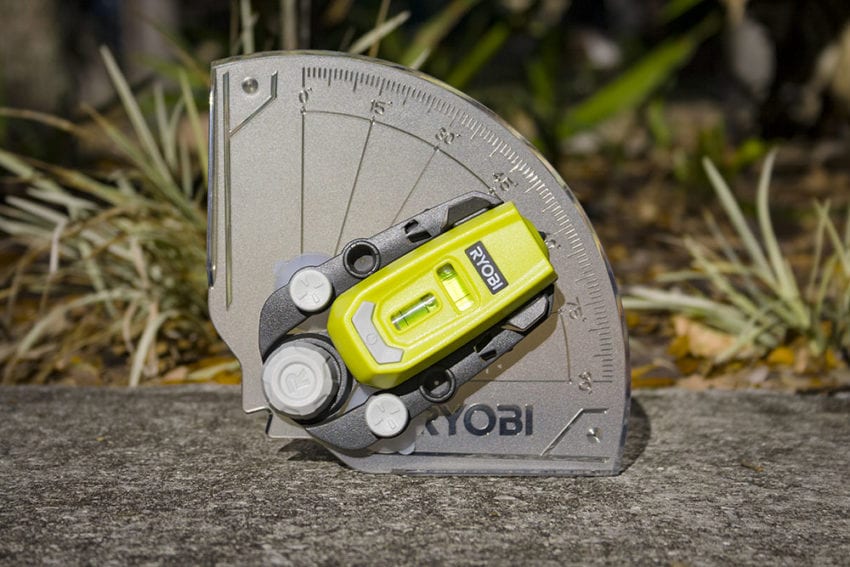
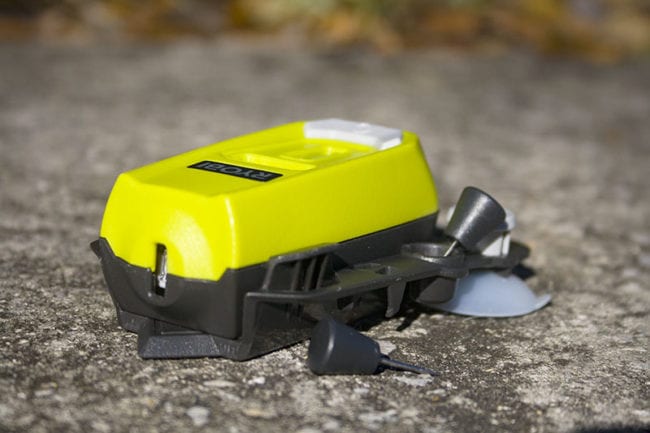
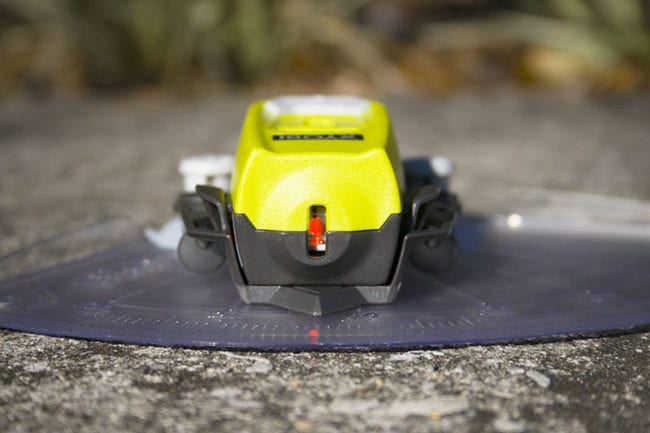
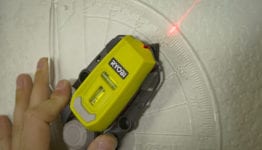
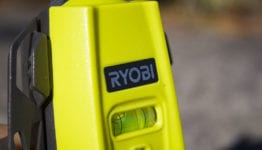
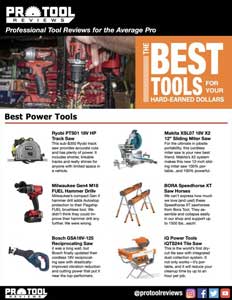


can the ELL1750 be used to check a floor for level? how?